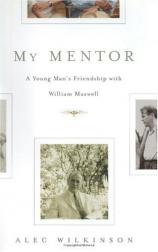My Mentor: A Young Man's Friendship With William Maxwell
Review
My Mentor: A Young Man's Friendship With William Maxwell
Those of us who weren't fortunate enough to have known the great
writer William Maxwell --- whose books include THE FOLDED LEAF, THE
CHATEAU, THEY CAME LIKE SWALLOWS, and SO LONG, SEE YOU TOMORROW ---
can count ourselves lucky that Alec Wilkinson did.
Wilkinson, longtime contributor to The New Yorker and author
of A VIOLENT ACT and BIG SUGAR, grew up down the street from
Maxwell, who was a close friend of his father's in addition to
being one of the greatest-ever editors of short fiction. When
Wilkinson was 24 and decided he wanted to write, he showed some of
his work to Maxwell, who was then editing stories at The New
Yorker and writing novels and short stories himself. They began
to work together regularly, sitting side-by-side as Maxwell
critiqued Wilkinson's manuscripts.
"What I felt when I sat down beside him was calm," Wilkinson
writes. "I had done all the work that I knew how to do, and now,
through his asking me what I really meant to say, or what had been
the resolution of the difficulty I had left off describing before I
should have, or whether I hadn't gone on too much in my reaction to
something, the piece would be made better than I knew how to make
it. When he was finished, I would appear to be smarter than I was
and more capable."
But MY MENTOR is much more than the remembrance of an
apprenticeship. Wilkinson wasn't close to his own father and in
Maxwell he found the kind of nurturing adult figure he needed ---
in life as much as in art. "Maxwell taught me to write the way
primitive fathers taught their sons to stalk, to study tracks, to
observe the behavior of their prey, to watch the sky for weather,
to note the bloom of the bush that signifies that the fish in their
migrations have returned to the river," he writes. As a substitute
father, teacher, and lifelong friend, Maxwell not only guided
Wilkinson in his writing, but helped him --- by advice and by
example --- in every aspect of life, including his eventual
understanding of his father's behavior and personality.
Wilkinson writes of his friend with profound adoration. His skill
is such that the memoir, though heartbreaking and suffused with
grief, never feels maudlin. His sentences are both straightforward
and lyrical; in a passage describing Maxwell's time in Martinique,
for example, he casually splices in poetry as if it's the most
natural thing in the world: "In the crotches of the trees orchids
bloomed, and sewage ran down the gutters." He's a master of subtly
slaying readers with profound epiphanies that hide at the ends of
paragraphs and utterly refuse to make a big deal of
themselves.
The book is written in such an intimate voice and with such sincere
devotion to its subject that the final scenes, involving Maxwell's
old age and death, are completely devastating. By the end of the
book, we've come to care so much for both Wilkinson and his mentor
that the loss --- not only the author's loss of Maxwell, but our
loss of the author's voice describing him --- is unbearable. But
it's balanced by the intense pleasure of having encountered two
such remarkable people at such close range. We leave the book both
crushed and uplifted, remembering Wilkinson's lingering impressions
of Maxwell: "The soft, glowing warmth of his eyes. His great
dignity, so natural and unforced, so courageous, never faltering
when his death was near. His being so present in his mind. His
compassion. His sympathy. His great capacity for friendship."
My Mentor: A Young Man's Friendship With William Maxwell
- Publication Date: April 4, 2002
- Genres: Nonfiction
- Hardcover: 192 pages
- Publisher: Houghton Mifflin Harcourt
- ISBN-10: 0618123016
- ISBN-13: 9780618123018



